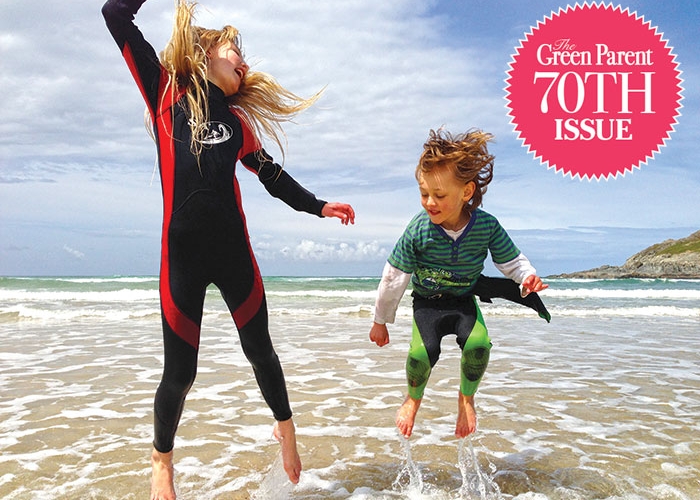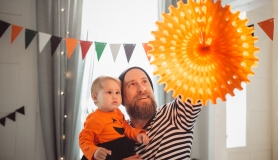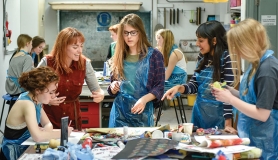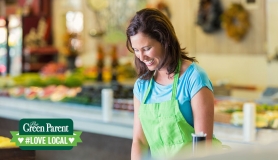This is one of the top twenty stories published in The Green Parent magazine from the last seventy issues. Want to read everything? This is just one of thousands of articles we’ve published. Read all our back issues online here – over 7,000 pages of content at your fingertips for £4.
When people find out we are a home educating family their reaction is often one of surprise. When, I then tell them we do not follow a set curriculum, we do not have a learning schedule or a yearly plan, their look often turns from surprise into something between confusion, disbelief and fear. We are, what some call, “Unschoolers” but personally I prefer the term, “Free Range” learners.
We were not always “Free Range” learners. I trained and taught for a short time as a Steiner Waldorf Class Teacher and when we first started home schooling, nearly five years ago, we did use a curriculum and I did spend many hours planning. It was basically school at home. As the years passed I noticed that my children’s enthusiasm to learn started to disappear. I panicked and started having thoughts like “What am I going to do? I can’t let them play ALL day!” but, slowly I started to unravel my firm held belief that children need to be told what to learn and started to see the learning value in the world around us. I let go of my fear over technology and instead, embraced and celebrated the creativity my children expressed through all forms of media. Our lives became more exciting as we let the world in and explored our different interests. I noticed how wide and varied each child’s interests were and at the same time embraced my own. Our twelve-year-old daughter is just as passionate about Jane Austen as she is Monster High. Last year she asked me to help her make a Regency style dress and bonnet for the Jane Austen parade in Bath. And on the other hand she busily creates bedrooms and cafes out of old shoe boxes for her ever growing collection of Monster High dolls.
“I noticed how wide and varied each child’s interests were and at the same time embraced my own”
Letting go and trusting
Honouring and following each person’s interest, leads you to many exciting places which you would never have known existed if you just adhered to a prescribed curriculum. That does not mean curriculum material cannot be used as a great resource sometimes, but it is more about picking and choosing. Another important lesson you learn through Free Range learning, is that you have to be prepared to let go of your child following everything through. They may be passionately involved in something one day and totally despondent about it the next. This can feel frustrating as a parent when you have put in a lot of effort finding resources but, I have come to trust that often my children dip into a something for a while then drop it and come back to it maybe weeks, months or even years later. It is a real test of faith in your children’s own learning process. It takes courage to trust they will learn what they need to learn, when they are ready to learn and that any kind of “Forced” learning does not work. Of course it works if you just want children to cram facts in their heads for tests and tick boxes but, if you want them to really develop a life long passion for learning and exploring the world, you need to allow them the freedom to try out many different experiences, in their own time and on their own terms. Seth Godin, author of fourteen books including titles such as, We Are All Weird and Poking the Box, states that the function of schools at present are about learning obedience and work on a model of education that is totally out dated. He says we need to throw out textbooks and give pupils the resources to “Go build something amazing”.
“As free range learners we encourage our children to think like entrepreneurs”
The world as resource
This does not mean Free Range learning is a total “Hands off” education either. I see my role as a facilitator of my children’s education. I seek out as many resources, materials and experiences for them to explore. Using the world around us to learn from, seems much more sensible than being sat in a classroom behind a desk all day. Rather than filling out work sheets with pictures of money, we go to the shop or the post office and use real money. Instead of reading Maths stories about imaginary train journeys, we take a ride on a real train, working out what time we have to leave the house and how long the journey will take.
Teacher and Educational Reformer, John Holt is the author of books such as How Children Fail and Teach Your Own. Holt states, ‘We can best help children learn, not by deciding what we think they should learn and thinking of ingenious ways to teach it to them, but by making the world, as far as we can, accessible to them, paying serious attention to what they do, answering their questions — if they have any — and helping them explore the things they are most interested in.’
Everyday maths
There are many questions home educators get asked, the most common are… ‘What about Maths? How can you teach at secondary school level?”. Middle and High School teacher, John Bennett explained in his 2011 TEDxTalk, that ‘99% of the population will not use any of the Math they learnt after ten years old, in their adults lives’. He also goes on to explain it has been proven that the best way to learn Maths is through games; board games, cards, movement and computer games. Another way to learn Maths is through running a business. As Free Range learners we encourage our children to think like entrepreneurs. Born out of her passion for making crafts, our twelve-year-old daughter created her own business called Crazy Moon. I act as her business partner and we run a stall at craft markets. The ideas and designs come from her and she runs an online Etsy shop. Through running this business she learns about profit margins and how to find the best price on materials. We’ve explored ideas of Free Economy, swaps (or the Letts system) as well as finding out more about sustainable living in a real way. We learn which vegetables are in season and therefore less expensive to buy, we learn which vegetables are most cost efficient to plant in our garden and how many eggs we need to keep and how many we can sell or offer for exchanges with friends.
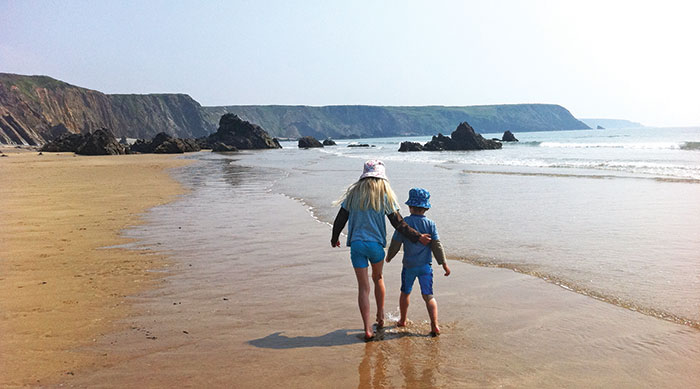
Learning to read naturally
Then comes literacy. It is not uncommon for people to sway slightly as if to fall over when I tell them that our daughter did not learn to read until she was nearly twelve years old. This was not due to a lack of encouragement. We did the whole “school at home” thing for a couple of years. I went through all the Phonics flashcards, workbooks, computer packages, read to her every day but she just was not ready. Only when I completely backed off did my daughter start to take an interest in and explore the books in our local library. She discovered books she was interested in and as a result, taught herself how to read. Now, she leaves the library arms pulled high with books every couple of weeks. When I worked as a teacher I found that trying to explain to children the complexities of the English Language was not easy. I would see a look of confusion and mistrust on the children’s faces as I tried to explain that the spelling rule I taught them the day before did not apply to the words we were working on that day. I experienced the same reaction from my daughter and so I gave up trying to push the rules of spelling. She is currently learning to spell through texting her friends, writing emails and writing in her journal.
Sometimes, the fear of Will my children know enough? does sneak back in especially, when I see the amount of work other children their age are doing in mainstream schools. Then, I try to look at the bigger picture and remember the words of W.B. Yeats; ‘Education is not the filling of a pail, but the lighting of a fire’. I believe the greatest education I can give my children is the knowledge of how to be in the “Real” world. How to embrace everything the world has to offer. How to connect and socialise with people of all ages, faiths and cultures but, most importantly, how to follow their own path in life, free from the expectations of others.
Luminara has been involved in Progressive Education and Parenting as a teacher, researcher, home educator and mother of two children for many years. She blogs at dreamingourselvesawake.wordpress.com.
Want to read more? Get your fix of awesome, thought-provoking articles delivered direct to your door here. The Green Parent is a bi-monthly print magazine, which costs just £8 for your first three issues. Find your tribe and get inspired!

